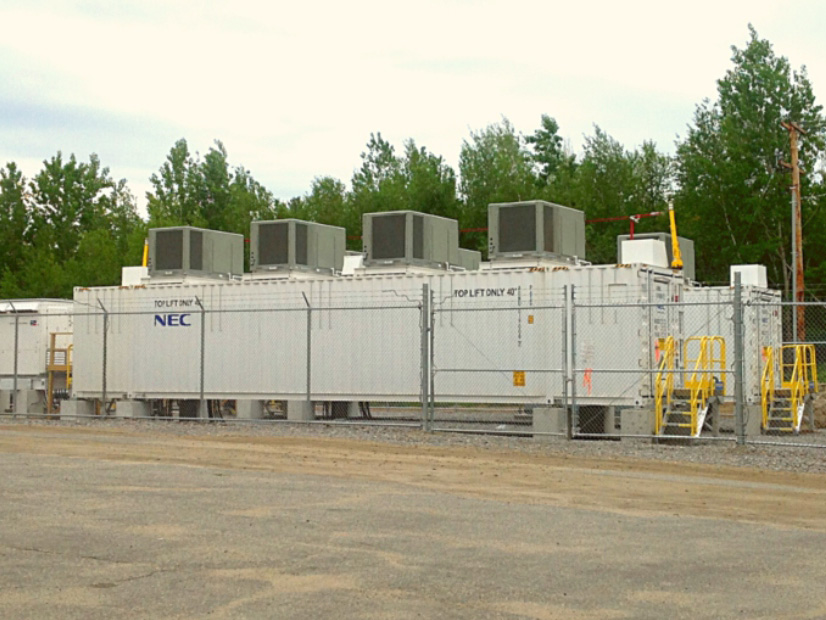Maine Gov. Janet Mills has signed a bill setting a 300-MW energy storage goal by 2025, rising to 400 MW by 2030.
The Act to Advance Energy Storage in Maine (LD 528) also directs regulators to open a docket to investigate time-of-use rates to signal to consumers when to reduce demand. The proceeding will include implementation of a pilot program for energy storage time-of-use rates.
The Energy Storage Association (ESA) applauded Maine for becoming the ninth state to set a storage target.
“It’s the summer of storage in New England,” ESA CEO Jason Burwen said in a statement.
Connecticut Gov. Ned Lamont signed a law earlier this month that targets the deployment of 1 GW of energy storage capacity by 2030. (See Connecticut General Assembly Passes Energy Storage Bill.)
Maine’s law directs Efficiency Maine Trust, the independent administrator for state programs to improve energy efficiency and reduce greenhouse gases, to consider expanding its current programs to support energy storage measures that reduce or shift demand or balance load. The trust also must establish a pilot program at the beginning of next year to deploy up to 15 MW of energy storage capacity for critical care facilities, such as hospitals and fire departments.
In addition, the law directs regulators to consider deploying a power-to-fuel pilot program for projects that convert renewable energy to hydrogen gas, methane or other fuel. The Public Utilities Commission will submit a report on the pilot next year to the Energy, Utilities and Technology Committee. The committee may report out a bill related to the agency’s findings during the next regular legislative session.
“Exploring and investing in energy storage will help Maine take better advantage of renewable energy sources,” Sen. Eloise Vitelli (D) said in a statement on the bill’s passage. “It will also increase the overall stability of our energy grid and support more jobs that come with our growing green energy industry.”
The law is designed to address shortfalls in Maine policy regarding storage that were identified by a 2019 state commission on energy storage, of which Vitelli was a member.
Green Bank
Mills also signed a bill last week that creates the Maine Clean Energy and Sustainability Accelerator, an entity to help deploy private capital in support of low- or zero-emissions goods and services.
“It is fantastic that Maine has joined a growing number of states in establishing its own green bank, and it has done so on a bipartisan basis,” Jeffrey Schub, executive director at Coalition for Green Capital, told NetZero Insider. “This continues the national trend of bipartisan support for mobilizing private investment and creating jobs while lowering energy costs through green bank investment. But to bring this policy to life, it needs funding from the matching bipartisan federal legislation.”
Rep. Debbie Dingell (D-Mich.) and 10 other Democrats joined with Republican Reps. Brian Fitzpatrick (Pa.) and Don Young (Alaska) to sponsor legislation earlier this year that would create a federal clean energy accelerator (HR 806).
“Congress must pass the Clean Energy and Sustainability Accelerator act to ensure Maine and every other state can realize these economic and energy benefits for their communities,” Schub said.
The law establishes the accelerator as a specialized financial entity under Efficiency Maine Trust. Its mandate is to support a rapid transition to a clean economy, and it must ensure that 40% of its investments are directed toward low-income communities and households, communities of color and tribal communities.
Offshore Wind Array
An act that directs Maine regulators to enter a long-term contract for a 144-MW floating offshore wind research array also gained the governor’s approval.
Mills signed the Act to Encourage Research to Support the Maine Offshore Wind Industry (LD 336), which allows a state utility to contract with New England Aqua Ventus — a joint venture between Mitsubishi Corp.’s Diamond Offshore Wind and RWE Renewables — for the project.
The bill builds on the current Aqua Ventus pilot project, which secured a 20-year power purchase agreement in 2019 for installation of one semisubmersible concrete floating platform for an 11-MW wind turbine. The pilot will be deployed near Monhegan Island about 14 miles from the Maine coast.
Aqua Ventus will test deep-water floating OSW technology designed by the University of Maine’s Advanced Structures and Composites Center. UMaine’s patented VolturnUS floating concrete hull is designed to hold turbines in waters deeper than 147 feet.
Any contract for the new array would require Aqua Ventus to build a facility in Maine to manufacture the VolturnUS, or similar hulls, for the project.



